It has been a habit since 2016. In the town of Buggenhout (Belgium), Xavier Brocorens, physiotherapist, once again welcomes the most heavily injured patient he has ever had to treat. Looking tired, Manuel Martinez enters his office, crutches in his arms. While lying down, the 42-year-old man with the round face, his hair slightly curly and graying, reveals a pockmarked left leg, marked by numerous scars. The still visible traces of a trauma, and the long work of reconstruction that followed.
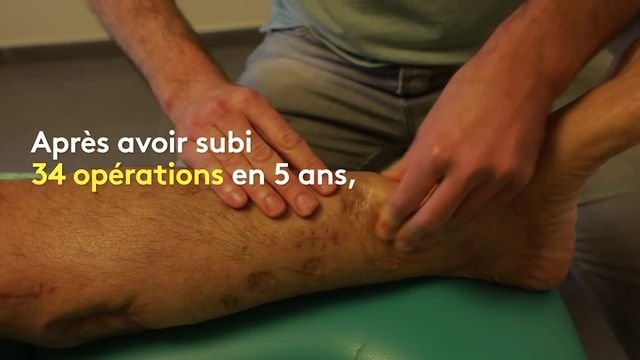
Xavier Brocorens deeply massages the calf of his patient, part of which disappeared five years earlier, on the morning of March 22, 2016. This former porter, who keeps his eyes closed and lets out a few breaths on the massage table, is a survivor . He is one of the 340 injured in the Brussels attacks, which left 32 dead between Zaventem airport, where he was, and Maelbeek metro station. A survivor almost as bruised five years later, so immersed in a slow repair.
Manuel Martinez comes here four times a week, tirelessly, despite the magnitude of the task. The attack turned this father of three into a staked daily life by medical care. There is this meeting with Xavier Brocorens, and a very regular work of rehabilitation in walking. Then an appointment with the orthopedist “two to three times a month”, not to mention the psychological and psychiatric follow-up and hospital stays, which are still numerous. Manuel Martinez had his 34th operation in five years on January 12. The 35th is scheduled for two days, March 24.
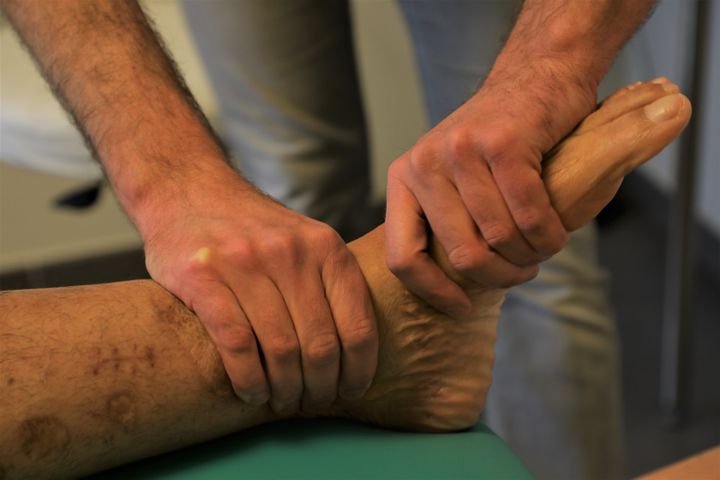
It is, once again, to “try to save my leg”he said in a calm voice from his living room. The forty-something now only lives on the ground floor, unable to climb the stairs. A large green space extends behind his home, but Manuel Martinez cannot walk more than ten meters. Always painfully, this man of Dominican origin puts his leg on his imposing sofa, under a blanket to protect it from the cold. A way to alleviate the pain somewhat, always “unbearable” at the level of the tibia and toes.
“My physical condition is critical. I’m still on crutches. I’m someone dependent on someone else.”
Manuel Martinez, survivor of the Brussels attacksto franceinfo
The fragility of Manuel Martinez’s body, five years later, reflects the extent of the injuries suffered in the departure hall of Zaventem. Thrown to the ground by the first explosion, at 7:58 a.m., the porter said he had his left leg “broken in two”, “the tibia completely burst” and his foot partially detached. “I was injured in the shoulder, my hand and my face were burned. I had splinters in the back, holes in the muscles in the tibia”, he describes with precision and composure. During the following five months, Manuel Martinez recounts having undergone twenty operations. “Every morning, the doctors met to find out whether or not to amputate”, he blurted out. A doctor will plead in front of his peers to preserve his leg, underlines the survivor.
Since then, Manuel Martinez “had to learn everything again”, Notes his physiotherapist. Xavier Brocorens salutes the work “magnificent” led by surgeons to reconstruct his left leg, “but he still has a lot of trouble”, he continues. Skin or fat grafts, work to make the toes work … “There are still a lot of operations for complications. And with each new operation, it takes a step back. The muscles are weaker again.”
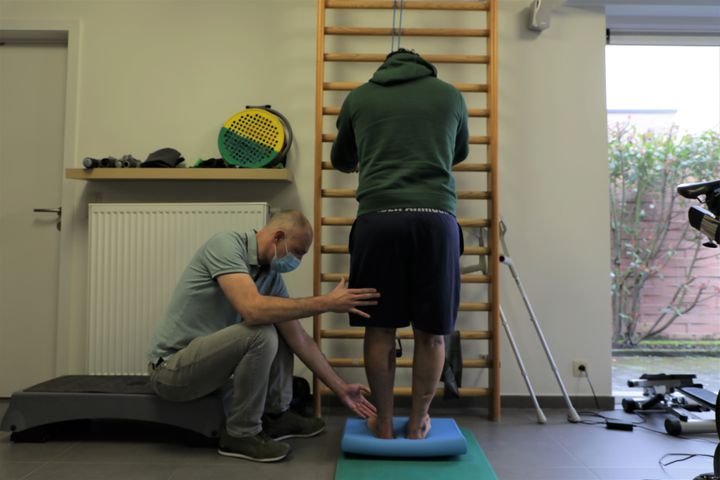
Any intervention is an additional burden for the patient, already weakened. “Each time, I take a month to recover”, testifies Manuel Martinez. To her, her heart attack earlier this month is no surprise. Saved by his daughter who took him to the hospital, he feels that his body is giving way. “I left the hospital a week ago. The injuries, my mental problem … A while ago is too much.”
In addition to this trying physical work, Manuel Martinez tries to rebuild himself psychologically. “I can’t take in the fact that I can’t walk anymore”, confides this former sportsman, baseball player since his adolescence in the Dominican Republic. Before 2016, “I played soccer with my son, I used to swim with him. And now I can’t do anything.”
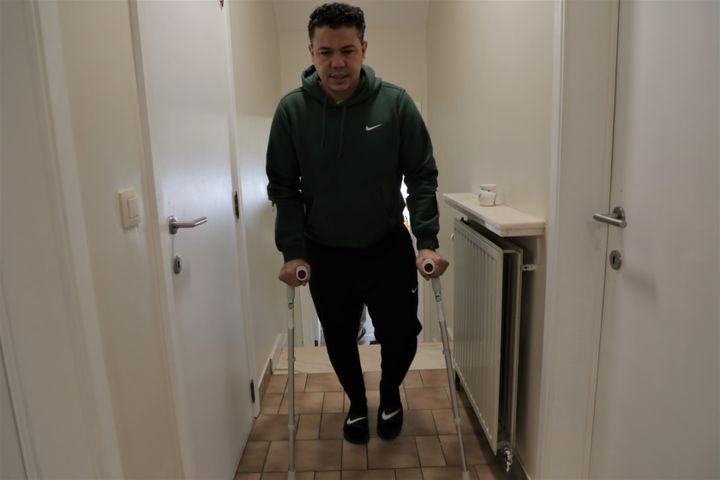
To the impossible mourning of an active life is added the trauma experienced that day. “Psychologically, I think I am even more affected than physically”, slips the former porter, unable to work since this breath which destroyed everything so close to him. This morning of March 22, 2016, Manuel Martinez arrived at 5 a.m. to manage oversized luggage, his job for twelve years. He remembers bringing a phone card to a Dominican passenger and her son shortly before “the disaster” takes place.
“This woman was screaming, ‘Where is my son? Where is my son?’ He had shards in his head and her eye was injured. I saw a lot of people dead, a lot of black smoke. “
Manuel Martinez, survivor of the Brussels attacksto franceinfo
Since, “the film of March 22 is never erased”, confides the survivor, who sleeps little as the nightmares are present. Sometimes traumatic images arise in broad daylight. “All these smells, the crying children, all these people” killed in front of his eyes cause countless flashes and anguish, still very vivid today. Just like a depressive state from which Manuel Martinez struggles to get out. With modesty, he explains that he stayed in a psychiatric center recently, and tried to end his life. Manuel Martinez knows it well, the attacks are “a horrible experience that I will never forget”. “My life is gone up in the air. I am mentally killed, an undead.”
This “horrible experience” and the traumas that followed, Manuel Martinez and Abdallah Lahlali lived it together, side by side. The two colleagues and friends were close to each other when the first detonation occurred. Abdallah Lahlali, also seriously injured in the left leg, was amputated. In turn, he testifies to psychological distress and the operations that accumulate.
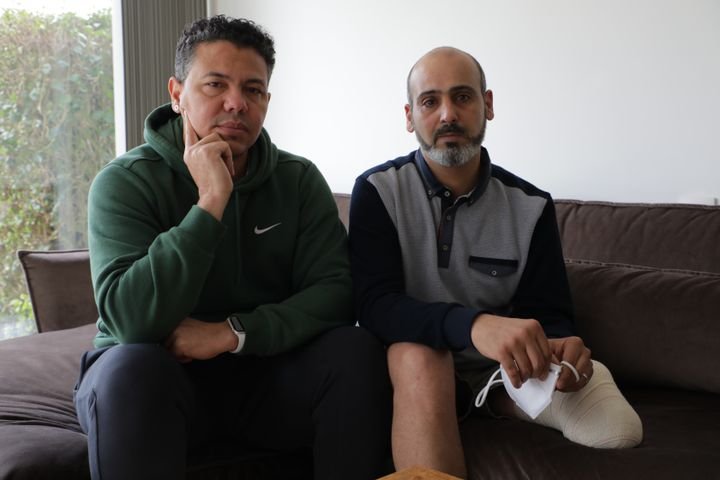
At the end of the morning, Manuel Martinez finds his colleague at home, about 30 minutes from Buggenhout. The two men are members of the Life4Brussels victim support association, co-founded by Loubna Selassi, Abdallah’s wife. Together, they often help each other for another ordeal in their daily life: the sequence of steps, multiple, to ensure their support. “We are looking for our rights ourselves”, confides, with a marked gaze, Abdallah Lahlali. Manuel Martinez, for example, informed him of the existence of protection for war invalids, and learned, thanks to his colleague, that other aid could help him finance the recourse to a third person.
“The Belgian state does nothing.”
Manuel Martinez, survivor of the Brussels attacksto franceinfo
Apart from emergency financial aid for hospitalized victims, Belgium “left it to the insurance companies to compensate the victims”, explains Valérie Gérard, one of the lawyers at Life4Brussels. The association asks “the creation of a guarantee fund, to take care of these victims proactively”. Because in fact, survivors find themselves “faced with a multitude of interlocutors, who sometimes ask for exactly the same documents”, specifies the lawyer. During expert reports, victims may have felt “humiliated”, their wounds “minimized”.
For healthcare in particular, insurance must, in principle, supplement the coverage of medical costs, continues Valérie Gérard. But some victims are reimbursed “with several months” delay. It is therefore their responsibility that heavy expenses are advanced. And for each reimbursement, supporting documents are requested. “I have a perforated leg, what proof do I give? Everything is there, everything is clear”, denounces the survivor.
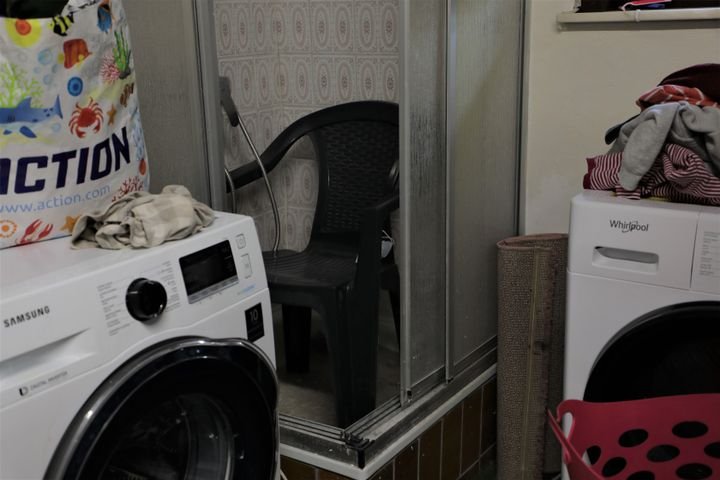
Exasperated, Manuel Martinez says he got into debt, sold jewelry to cover certain costs. On the ground floor of his house, the forty-something has installed a chair in the shower of an aging bathroom, unable to stand up when washed. He was injured there almost a year ago. But his insurance, he says, does not agree, at this stage, to finance a suitable space. “They consider that one day, I will get better”, he laments. “Am I going to wait another five years like this?”
